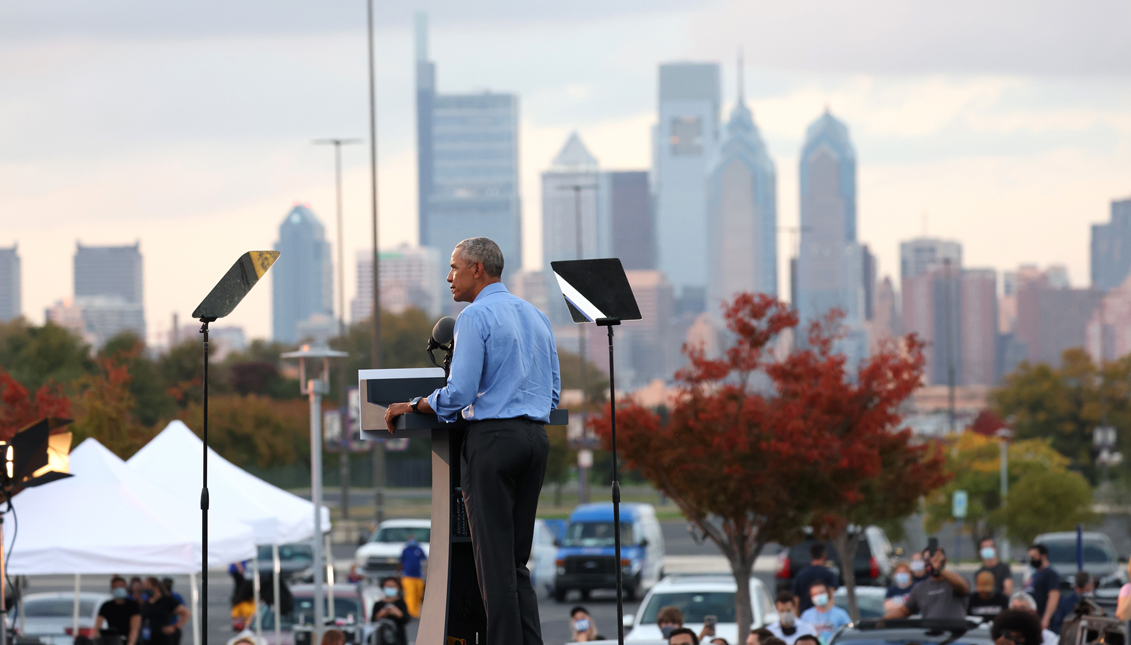
Obama’s visit to Philly reminds us of the crucial Black and Latino male vote
Black and Latino men statistically don’t vote as much as their female counterparts.
The Presidential Election of 2020 has long been touted to be the year Latinx voters make a decisive mark as the largest non-white voting bloc eligible to vote.
Latinx voters have the power to make or break the election, but one of the cracks in our numbers is the gender voting gap. Latinas and Hispanic women statistically show up to vote at rates higher than men.
Gender gaps exist in nearly every demographic. But for Black and Latino voters, the issue is crucial in cities similar to Philadelphia, where the futures of communities disenfranchised by racist tactics like red-lining depend on self-representation, through methods like Census completion and voting for down-ballot candidates.
Biden leads Trump by 34 points among Latina women, according to the latest polls reported by the New York Times. Among Latino men, the gap is much narrower, with a lead of just eight points. Interestingly, the pattern follows among Latino college grads and those without a degree.
Another issue eating at the potential of the Latinx vote to favor Democrats is the inexplicable phenomenon of Latinos for Trump.
While yes, the overall majority of Latinx voters go Democratic, Hispanic, and Latino men are a cornerstone of Donald Trump’s voting base. Though not the majority of the president’s support, the male component of Latinos for Trump is unwavering in its support.
This “macho appeal” not only highlights the voting gap. It also points to the enduring sexism within Hispanic and Latino voters who are pulling for Trump. For men as a whole, it is much easier to ignore the allegations and recordings that confirm Trump’s immoral treatment of women. As long as the economy is doing alright.
But now, with a pandemic that has taken the lives of Latinos and stifled economic growth among their demographic in a way unlike any other, there may be newfound room to waver in allegiance.
That’s where Obama comes in, the Democrats’ top campaigner.
The former President held a drive-in rally in South Philadelphia Wednesday night, focused on the Black and Latinx vote — with an emphasis on the men.
Pennsylvania is the nation’s number one battleground state, just 12 days before the Presidential Election.
Black voters, particularly in large cities like Philadelphia, are critical to Biden’s chances to tip the scale. With Obama the Biden campaign is trying to mobilize the voting bloc, especially after Black turnout alarmingly dropped nationwide in 2016.
“We’re going to be the battleground, and I think President Obama’s visit is a reflection of that,” Cherelle Parker, the Philadelphia City Council’s majority leader, a local Biden campaigner told POLITICO. “His intentions are to remind the Black community, and particularly Black men, that your vote counts.”
RELATED CONTENT
Obama won Pennsylvania twice over both of his election campaigns, in part because of the large-scale support among Black voters. In some wards of Philadelphia with large Black populations, POLITICO reports Obama garnered over 99% of the vote.
Biden is unlikely to see similar numbers, but Obama is likely to lend some influence.
Especially in the context of Black and Latino voters, Obama’s visit to Philly reminds us of the crucial need to mobilize their vote just days before a pivotal election.
It can be juxtaposed with the potential power of the Latina vote this year.
Following the record-breaking midterm turnout of 2018, Latinas are expected to play a decisive role in November.
A study by EquisResearch found Latinas are far more anti-Trump than Latinos.
The role that Latinas play in communities and families is no small thing. The role of the matriarch, the glue that especially in Latinx families holds them together, has a tremendous influence on the leanings of a family as a whole. Latina voters are more likely to encourage friends and family to vote too.
And according to Pew Research, 55% of women who were eligible to vote cast ballots in the 2018 midterms in November, compared to 51% of men. In the study, Hispanic women were also found to be more dissatisfied with the way things are going in the country today compared to men.
Latinas and Black voters are the silver lining in this, but they cannot be expected to carry the elections themselves. Perhaps this year men will follow suit and #votelikeamadre.











LEAVE A COMMENT: